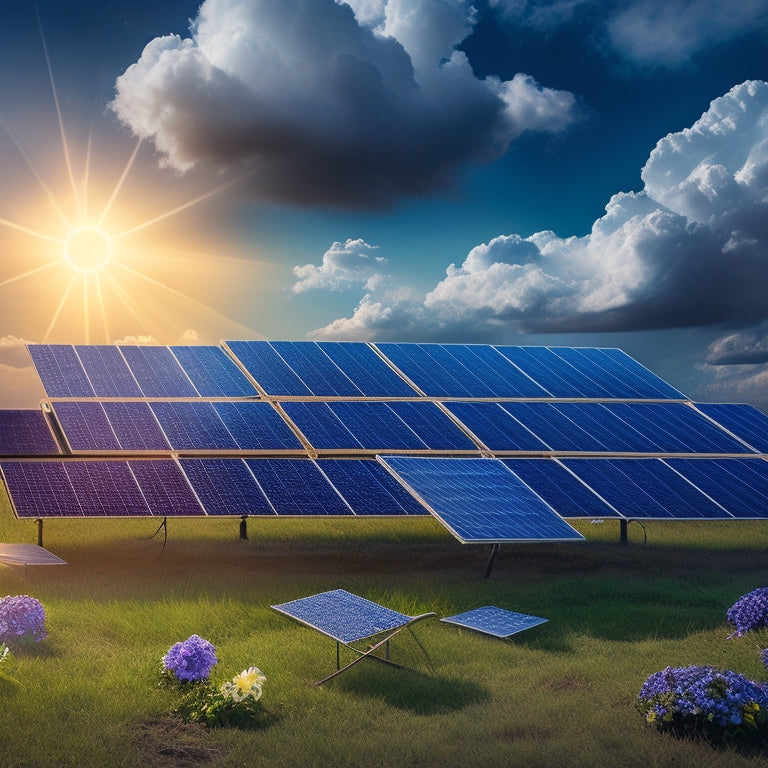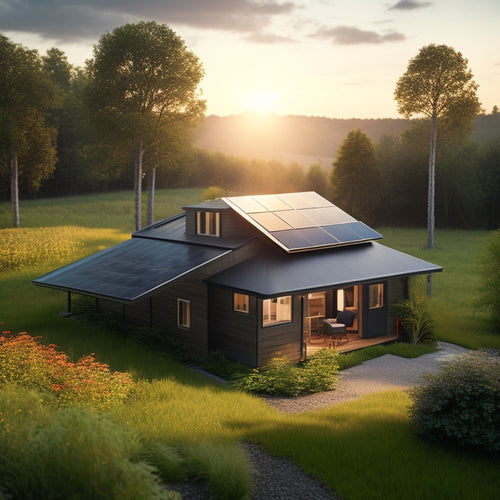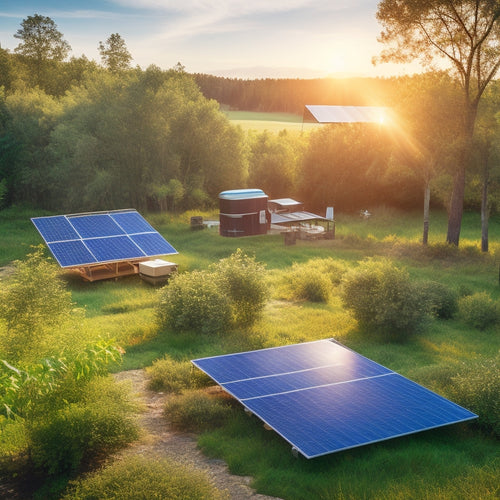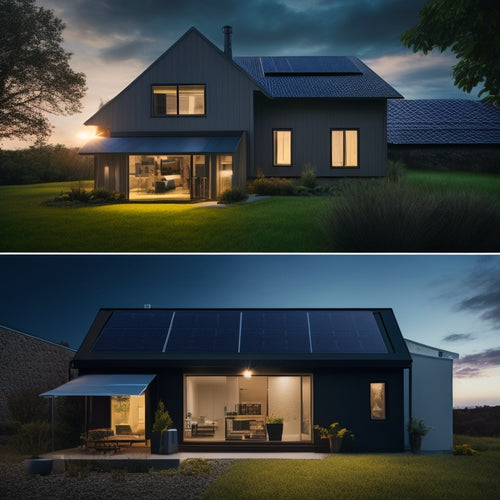
What Affects Solar Panel Efficiency and Storage?
Share
You'll find that your solar panel system's efficiency and storage capacity are influenced by several key factors. The quality and durability of your panels, as well as the environmental conditions they operate in, can greatly impact performance. Proper installation and maintenance are also important, as is the efficiency of your inverter. Additionally, the health and longevity of your battery storage system play a significant role. From high temperatures and shading to inverter efficiency ratings and battery capacity, it is crucial to understand these complex interactions to optimize your system's output. As you investigate these factors further, you'll uncover even more subtleties that can make all the difference.
Overview
- High temperatures, shading, humidity, and air pollution can reduce solar panel efficiency, emphasizing the need for optimal installation and maintenance.
- Inverter efficiency plays a critical role in converting DC power to AC, with high conversion efficiency ratings and low standby power consumption being essential.
- Battery health and longevity are affected by charging cycles, extreme temperatures, and maintenance, requiring regular monitoring and optimization.
- Quality and durability of solar panels and components impact overall system performance and lifespan, making reputable manufacturers and proven track records crucial.
- Environmental factors, installation techniques, and maintenance practices all interact to affect solar panel efficiency and storage, requiring a comprehensive understanding for optimal performance.
Panel Quality and Durability
With solar panels being a long-term investment, their quality and durability play an essential role in determining their overall performance and lifespan.
You need to take into account the panel materials and manufacturing processes that go into creating your solar panels. High-quality panels are built with durable materials that can withstand various environmental conditions, guaranteeing peak energy output.
For instance, high-efficiency silicon solar cells can achieve conversion rates over 26%, making them suitable for off-grid systems.
The manufacturing process also affects the panel's efficiency, with reputable manufacturers using advanced technology to minimize defects and maximize energy production.
By choosing high-quality panels, you're investing in a reliable source of clean energy that will last for years to come.
Look for panels with a proven track record of performance and durability to confirm you're getting the most out of your solar panel system.
Environmental Factors at Play
Optimizing your solar panel system's performance also involves understanding the environmental factors that impact its efficiency. You need to evaluate how temperature effects and shading issues can reduce your system's output.
| Environmental Factor | Impact on Efficiency |
|---|---|
| High temperatures | Reduces efficiency by up to 0.5% per degree Celsius above 25°C |
| Shading | Can reduce output by up to 20% depending on the extent of shading |
| Humidity | Can reduce output by up to 1% in high-humidity environments |
| Air pollution | Can reduce output by up to 2% due to dust and debris accumulation |
Installation and Maintenance Matters
Your solar panel system's performance isn't just about environmental factors; it's also heavily influenced by the quality of its installation and ongoing maintenance. A well-designed and executed installation can greatly enhance your system's efficiency. Proper installation techniques, such as ideal panel tilt and orientation, can maximize energy output.
In addition, regular maintenance practices are essential to guarantee your system operates at its best. Regular monitoring of battery state of charge and depth of discharge battery monitoring and maintenance can prevent overcharging and undercharging, and regular cleaning of terminals and connectors prevents corrosion buildup.
You should regularly inspect and clean your panels to remove debris and dirt that can reduce efficiency. Moreover, monitoring your system's performance and addressing any issues promptly can prevent energy losses.
Inverter Efficiency Impact
Utilizing the full potential of your solar panel system relies heavily on the efficiency of its inverter, a critical component that converts DC power from the panels into usable AC power for your home.
You've got two main inverter types to evaluate: string inverters and microinverters. String inverters are the most common, but they can be less efficient due to conversion losses. Microinverters, on the other hand, enhance energy output at the individual panel level, resulting in higher overall efficiency.
When assessing inverters, it's crucial to evaluate inverter efficiency ratings, such as CEC, for maximum energy conversion, and guarantee compliance with industry standards like UL 1741 and IEEE 1547 for safe operation.
When choosing an inverter, look for high conversion efficiency ratings and low standby power consumption. Even small gains in inverter efficiency can add up to significant energy savings over time, giving you more freedom to power your life with clean, renewable energy.
Battery Health and Longevity
Battery health and longevity play a critical role in guaranteeing the overall performance and reliability of your solar panel system. You need to monitor and maintain your battery's health to maximize its lifespan.
A key factor affecting battery health is its capacity, which decreases over time due to charging cycles. The more cycles your battery goes through, the more its capacity degrades.
To minimize this effect, it's important to optimize your charging and discharging patterns. You should also avoid extreme temperatures, as they can accelerate degradation.
Frequently Asked Questions
Do Solar Panels Work During Power Outages?
During power outages, you won't get electricity from your solar panels unless you have a grid connection with a battery backup, and you've performed regular solar panel maintenance to guarantee peak performance.
How Does Snow Impact Solar Panel Performance?
As winter's icy grip tightens, you'll notice snow accumulation burdening your solar panels, reducing energy output by up to 50%. Regular solar panel maintenance is key to brushing off the impact, ensuring maximum energy independence.
Can I Use Solar Panels for My Electric Vehicle?
You can definitely use solar panels to charge your electric vehicle through solar panel integration, allowing you to utilize renewable energy and reduce your carbon footprint; just verify your solar panel system is designed to meet your vehicle's electric vehicle charging needs.
Are There Any Solar Panels Specifically for Hot Climates?
As you traverse the scorching desert, imagine a solar panel as an oasis, utilizing the sun's power. You'll find high-temperature performers, like silicon-based panels, designed to thrive in hot climates, optimizing panel material efficiency to fuel your electric vehicle and release freedom on the open road.
Do Solar Panels Produce DC or AC Power?
You'll find that solar panels produce DC power, which is then converted to AC power through an inverter, impacting overall system efficiency; the type of panel and inverter efficiency also affect power output, especially when connected to the grid.
Ready to Buy
As you weigh your solar panel investment, remember that a million tiny details can make or break your system's efficiency and storage. From panel quality to environmental factors, installation, and maintenance, every aspect plays an essential role. Don't underestimate the impact of inverter efficiency and battery health - they're the unsung heroes of your solar setup. By considering these factors, you'll be utilizing the sun's energy like a pro, and reaping the rewards for years to come.
Related Posts
-

Diy Off Grid Solar
By embracing DIY off-grid solar, you can break free from grid dependence, slashing your energy bills by up to 90% and...
-

Top Off Grid Solar Batteries for Renewable Energy
When seeking top off-grid solar batteries for renewable energy, consider options with advanced battery chemistry, suc...
-

Cost of Home Solar Battery
You're looking to invest in a home solar battery to reduce your grid reliance, but you're curious about the cost. The...


